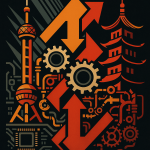Key Points
- The China Securities Regulatory Commission (CSRC) is now officially sanctioning accomplices and collaborators in financial fraud, a major shift in policy.
- In the landmark Yuebo Powertrain (越博动力) case, the delisted company and its personnel were fined ¥30.8 million RMB ($4.25 million USD), and for the first time, two accomplices were also fined ¥2 million RMB and ¥300,000 RMB respectively.
- This new strategy, termed “full-chain” accountability, aims to dismantle the entire “fraud ecosystem” by targeting key individuals, gatekeepers, and third-party facilitators.
- The CSRC plans to enforce this through a combination of administrative fines, civil lawsuits, and criminal prosecution, with a new policy for leniency for those who cooperate.

China’s top securities regulator, the CSRC, is escalating its war on financial fraud, and for the first time, it’s not just the masterminds who are paying the price.
In a landmark move, the China Securities Regulatory Commission (CSRC) has begun officially sanctioning the accomplices and collaborators who help companies cook their books.
This is a huge deal for anyone investing in, or doing business with, Chinese companies.
The game has officially changed.
The Takedown: A Look Inside the Yuebo Powertrain Case
The first shot was fired in a case involving Nanjing Yuebo Powertrain Co., Ltd. (Yuebo Powertrain, 越博动力), a now-delisted company.
Here’s the breakdown of what went down:
- The Scheme: From 2018 to 2022, Yuebo Powertrain massively inflated its revenue and profits.
- The Method: They faked sales of new energy vehicle powertrains and used deceptive asset sales to create the illusion of a booming business.
- The Result: The company’s annual reports were packed with false information, misleading investors and the market.
The Penalties: Hitting Everyone Involved
The CSRC didn’t hold back. They came down hard on the company and its leadership.
- A total fine of ¥30.8 million RMB ($4.25 million USD) was levied against Yuebo Powertrain and its responsible personnel.
- Two key individuals involved are now facing bans from the securities market for 8 to 10 years.
But here’s the real kicker.
For the first time, the CSRC went after the collaborators—the people who provided the shell companies and resources to make the fraud possible.
- Accomplice #1 (Mr. Yu): Fined ¥2 million RMB ($276,000 USD) for providing companies he controlled to facilitate the fake transactions.
- Accomplice #2 (Mr. He): Fined ¥300,000 RMB ($41,400 USD) for his role in the scheme.
And it might not stop there. The CSRC has made it clear that any suspected criminal offenses will be handed over to the police for criminal prosecution.

Find Top Talent on China's Leading Networks
- Post Across China's Job Sites from $299 / role
- Qualified Applicant Bundles
- One Central Candidate Hub
Your First Job Post Use Checkout Code 'Fresh20'

Why This Isn’t Just Another Slap on the Wrist: The “Full-Chain” Accountability
- Key Individuals: Actual controllers, major shareholders, senior management
- Gatekeepers: Sponsors, auditors, law firms
- Accomplices: Third parties who actively assist in fraud
Financial fraud, which the CSRC calls a “cancerous growth,” has always been a target.
But the approach is getting more aggressive and, frankly, much smarter.
The regulator is adopting what it calls a “sharp-toothed and sharp-edged” strategy.
This isn’t just about punishing the fraudulent company anymore. It’s about taking down the entire support system.
The CSRC is now laser-focused on:
- “Key Individuals”: The actual controllers, major shareholders, and senior management who orchestrate the fraud.
- “Gatekeepers”: The sponsors, auditors, and law firms that are supposed to prevent this stuff but sometimes fail in their duties.
- “Accomplices”: The third parties who actively help carry out the fraud.
This strategy of “full-chain” accountability is designed to dismantle the entire fraudulent operation, from top to bottom.

ExpatInvest China
Grow Your RMB in China:
- Invest Your RMB Locally
- Buy & Sell Online in CN¥
- No Lock-In Periods
- English Service & Data
- Start with Only ¥1,000

The Rise of the “Fraud Ecosystem”
So, why the change in strategy?
Because the nature of fraud itself is evolving.
We’re seeing more complex schemes where third parties and listed companies collude, creating intricate “interest chains” and entire “fraud ecosystems.”
These networks are designed to be confusing and hard to unravel, making it difficult to pinpoint responsibility.
They pollute the market environment and seriously damage investor trust.
The CSRC’s new approach is a direct response to this trend. In June of last year, it worked with the Ministry of Public Security and other government bodies to create a new playbook: the “Opinions on Further Improving the Comprehensive Prevention and Control of Financial Fraud in the Capital Market.”
This plan explicitly calls for cracking down on anyone who assists in fraud.
The Yuebo Powertrain case is simply the first public execution of this new, tougher policy.

Resume Captain
Your AI Career Toolkit:
- AI Resume Optimization
- Custom Cover Letters
- LinkedIn Profile Boost
- Interview Question Prep
- Salary Negotiation Agent

What’s Next? The Future of China’s Capital Market Enforcement
- Administrative: Fines and market bans
- Civil: Investor lawsuits
- Criminal: Prosecution and potential jail time
Get ready for more of this.
The CSRC is doubling down on its principle of “pursuing the principal offender” while simultaneously “striking down accomplices.”
They plan to use an integrated system of punishment across three fronts:
- Administrative: Fines and market bans from the CSRC.
- Civil: Lawsuits from investors and other damaged parties.
- Criminal: Prosecution and potential jail time.
The goal is to completely break the “interest chains” that make large-scale fraud possible.
However, there’s also a carrot with the stick.
The CSRC has a leniency policy. Parties who actively cooperate with investigations, fix their mistakes, or provide valuable information may receive lighter penalties or even be exempted from punishment.
The message is clear: the risk of participating in financial fraud in China, even in a minor role, has never been higher.
This crackdown on the entire financial fraud ecosystem is a major step toward building a more transparent and trustworthy market for everyone.





![Pinduoduo's Playbook: How C2M and Social Shopping Built an E-commerce Giant [FreshFromChina]](https://freshfromchina.com/wp-content/uploads/2025/05/Pinduoduos_Playbook_How_C2M_and_Social_Shopping_Built_an_E-commerce_Giant_TeamedUpChina-150x150.png)